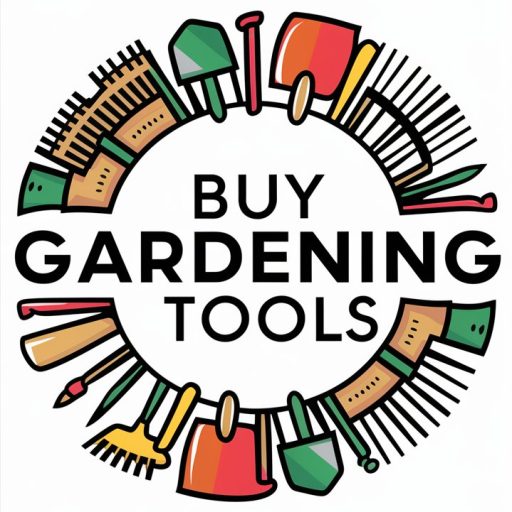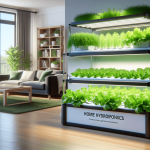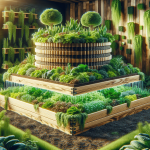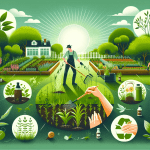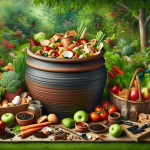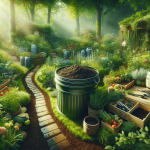This post may contain affiliate links. As an Amazon Associate, we may earn commissions from qualifying purchases.
Curious to know which type of mulch will best serve your garden this year? In “What Are The Pros And Cons Of Different Types Of Mulch?”, you’ll explore the benefits and drawbacks of various mulching options available to you. From enriching your soil with organic mulches, like wood chips and straw, to the low-maintenance appeal of inorganic choices, such as rubber and landscape fabric, this article will help you make an informed decision that suits your gardening needs. Whether you’re aiming for a lush vegetable patch or a pristine flower bed, you’ll find insights here that make your mulching task a breeze. Have you ever wondered what kind of mulch would be best for your garden? With so many varieties available, it can be overwhelming to choose. In this article, you’re going to explore the pros and cons of different types of mulch to help you make an informed decision.
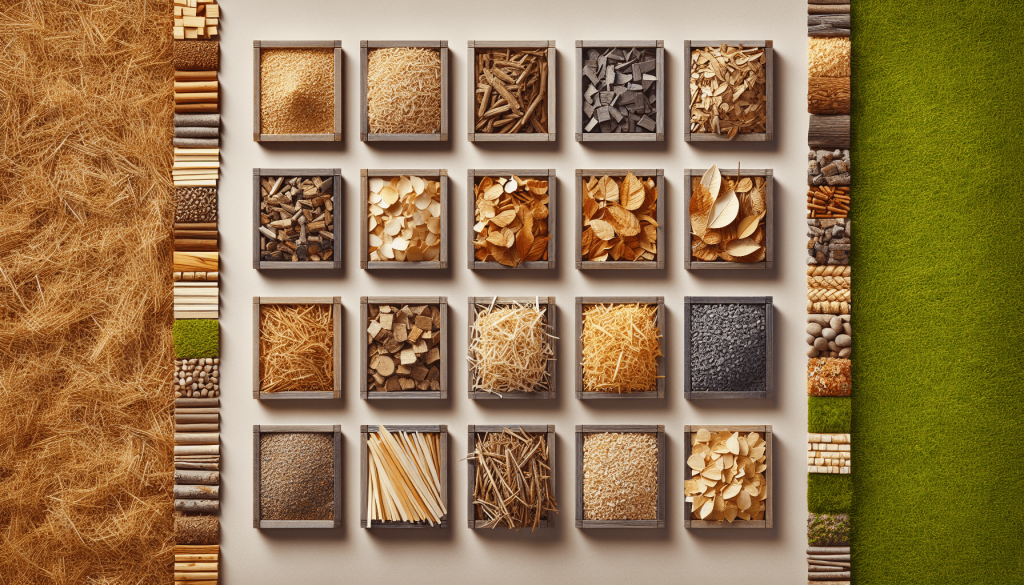
What is Mulch?
Mulch is a material spread over the surface of the soil to retain moisture, reduce erosion, and suppress weeds. It significantly enhances the health and fertility of your soil. There are various types of mulch, each with distinct advantages and disadvantages. Understanding these differences is key to optimizing your garden’s yield and appearance.
Organic Mulch
Organic mulch originates from once-living materials, making it ecologically friendly and beneficial for soil health.
Wood Chips and Bark
These are popular choices for mulching because they provide a natural look and break down slowly, adding organic matter to your soil.
Pros
- Aesthetic Appeal: Wood chips and bark provide a tidy, natural look.
- Weed Control: Effectively suppress weeds.
- Soil Enrichment: As they decompose, they improve soil structure and nutrient content.
Cons
- Cost: Can be pricey, particularly for larger areas.
- Nitrogen Depletion: Can temporarily reduce nitrogen levels in the soil as they decompose.
- Pest Attraction: Might attract pests like termites and ants.
Leaf Mulch
If you have an abundance of fallen leaves in your yard, consider converting them into leaf mulch. It’s a cost-effective way to recycle garden waste.
Pros
- Cheap and Readily Available: Often free and abundant.
- Nutrient-Rich: Decomposes quickly, returning nutrients to the soil.
- Increases Earthworms: Promotes earthworm activity, which is beneficial for soil health.
Cons
- Appearance: Can look untidy and might blow away.
- Short Lifespan: Breaks down quickly, requiring frequent reapplication.
- Pest Attraction: Can attract pests if applied too thickly.
Grass Clippings
Grass clippings are an excellent source of nitrogen, and they can also be used as mulch.
Pros
- Readily Available: Especially if you mow your lawn frequently.
- High Nitrogen Content: Excellent for boosting soil fertility.
- Improved Soil Structure: Break down quickly, enriching your soil.
Cons
- Matting: Can clump together, creating a barrier that prevents water from reaching the soil.
- Weed Seeds: If your lawn has weeds, these can be transferred to your garden.
- Odor: Can develop a strong odor as they decompose.
Straw and Hay
These mulches are great for vegetable gardens, and they decompose slower than grass clippings.
Pros
- Good Insulation: Effective at regulating soil temperature.
- Erosion Control: Helps prevent soil erosion.
- Nitrogen Addition: Enhances nitrogen levels as it decomposes.
Cons
- Cost: Can be expensive, particularly if not locally available.
- Weeds: Some types may contain weed seeds.
- Short Lifespan: Breaks down quickly, necessitating frequent replacement.
Inorganic Mulch
Inorganic mulch is derived from non-living materials. While these don’t decompose and enrich the soil, they provide long-lasting benefits.
Gravel and Stones
These materials are often used for decorative purposes and are best for areas with minimal plant growth.
Pros
- Durability: Long-lasting and doesn’t decompose.
- Aesthetics: Offers a clean, modern look.
- Fire Resistance: Doesn’t pose a fire risk.
Cons
- Cost: Can be expensive to install and transport.
- Heat: Absorbs and retains heat, which can stress plants.
- Soil Compaction: Can compact the soil underneath, hindering water and nutrient penetration.
Landscape Fabric
Landscape fabric is used under other types of mulch to prevent weed growth.
Pros
- Weed Control: Highly effective at suppressing weeds.
- Longevity: Durable and long-lasting.
- Soil Moisture: Helps retain soil moisture.
Cons
- Costly: Can be expensive to install.
- Maintenance: Can become exposed, requiring reapplication of surface mulch.
- Root Restriction: Can hinder root growth if not properly installed.
Black Plastic
This is commonly used in vegetable gardens to warm the soil and control weeds.
Pros
- Temperature Regulation: Warms the soil, speeding up plant growth.
- Moisture Retention: Keeps the soil moist by reducing evaporation.
- Effective Weed Control: Prevents weed growth.
Cons
- Environmental Concerns: Not biodegradable and can contribute to plastic waste.
- Cost: Can be expensive.
- Labor-Intensive: Requires considerable effort to install and remove.
Rubber Mulch
This mulch is made from recycled rubber tires and is gaining popularity for playgrounds and ornamental gardens.
Pros
- Durability: Extremely long-lasting and doesn’t decompose.
- Safety: Cushioning effect makes it ideal for play areas.
- Weed Control: Excellent at suppressing weeds.
Cons
- Cost: Can be quite expensive.
- Heat: Retains heat, which can damage plants.
- Chemical Concerns: Potentially harmful chemicals may leach into the soil over time.
Comparisons and Summary
To help you see the pros and cons at a glance, here’s a table summarizing the key points of each type of mulch:
| Type of Mulch | Pros | Cons |
|---|---|---|
| Wood Chips and Bark | Aesthetic appeal, weed control, soil enrichment | Cost, nitrogen depletion, pest attraction |
| Leaf Mulch | Cheap, nutrient-rich, increases earthworms | Untidy appearance, short lifespan, pest attraction |
| Grass Clippings | Readily available, high nitrogen content, improved soil structure | Can mat, weed seeds, odor |
| Straw and Hay | Good insulation, erosion control, nitrogen addition | Cost, weed seeds, short lifespan |
| Gravel and Stones | Durability, aesthetics, fire resistance | Cost, heat retention, soil compaction |
| Landscape Fabric | Weed control, longevity, soil moisture retention | Costly, maintenance, root restriction |
| Black Plastic | Temperature regulation, moisture retention, effective weed control | Environmental concerns, cost, labor-intensive |
| Rubber Mulch | Durability, safety for play areas, excellent weed control | Cost, heat retention, potential chemical leaching |
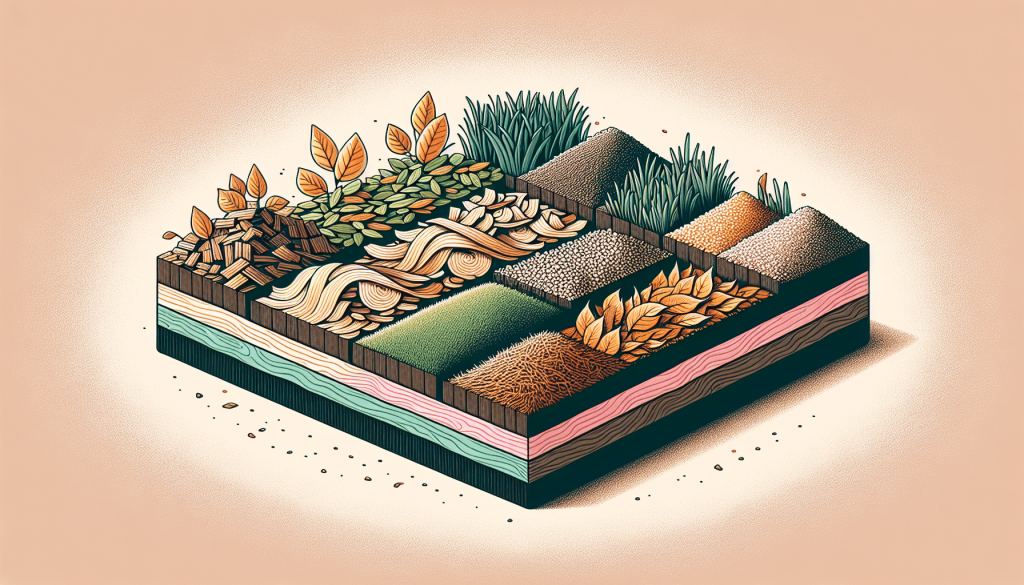
Final Thoughts
There’s no one-size-fits-all when it comes to mulch. The best choice for you depends on your specific gardening needs, budget, and aesthetic preferences. Organic mulches like wood chips and leaf mulch are excellent for improving soil health but may require more frequent reapplication. Inorganic options like gravel, landscape fabric, and rubber mulch offer durability and low maintenance but come with their own set of drawbacks.
By considering the pros and cons of each type of mulch, you can create a garden environment that thrives both in appearance and health. So, the next time you’re choosing mulch, you’ll feel empowered with the knowledge to make the best choice for your garden’s unique needs. Happy gardening!
